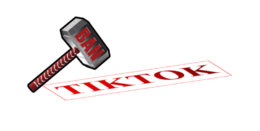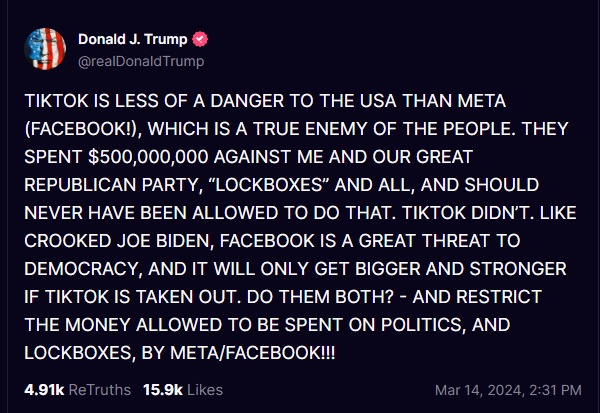You are using an out of date browser. It may not display this or other websites correctly.
You should upgrade or use an alternative browser.
You should upgrade or use an alternative browser.
TicTock ⏰ WOW
- Thread starter StevieRay
- Start date
I like hearing Shapiro school Libs but he has TRULY revealed himself in recent times
Ben is NOT stupid, he know whats up but will protect criminals and at ALL costs......
Never forget he posted those fake burnt baby images THEY tried to pass off as real
He denied Tunnel gate even as 4 bloody child sized mattresses were revealed to the pubic
Im sure he is a hero of that demented ScottL
Ben is NOT stupid, he know whats up but will protect criminals and at ALL costs......
Never forget he posted those fake burnt baby images THEY tried to pass off as real
He denied Tunnel gate even as 4 bloody child sized mattresses were revealed to the pubic
Im sure he is a hero of that demented ScottL

Maher warns lawmakers of TikTok’s power to ‘change people’s minds’ - Washington Examiner
Bill Maher is fearful that TikTok has an ability to "change people's minds," he told House members Ro Khanna and Nancy Mace.
Lord Forbid the TRUTH getting out there...first they lost Twitter...just imagine if the Youth of the World are exposed to more facts rather than fiction.
Most of it is absolutely innocent. But it’s also there when [the CCP] needs it not to be. And we saw that after the Israeli war broke out because the kids all wound up on the side of Hamas,” Maher said. “So yes, you keep it there, and you keep it innocent. It’s mostly just dancing. When you need it to change people’s minds? Don’t kid yourself. They do have it, and they’re not acting in our best interests.”
That Fox video, while nice doesnt go with this post....too many windows open...lol
Maher warns lawmakers of TikTok’s power to ‘change people’s minds’ - Washington Examiner
Bill Maher is fearful that TikTok has an ability to "change people's minds," he told House members Ro Khanna and Nancy Mace.www.washingtonexaminer.com
Lord Forbid the TRUTH getting out there...first they lost Twitter...just imagine if the Youth of the World are exposed to more facts rather than fiction.
Most of it is absolutely innocent. But it’s also there when [the CCP] needs it not to be. And we saw that after the Israeli war broke out because the kids all wound up on the side of Hamas,” Maher said. “So yes, you keep it there, and you keep it innocent. It’s mostly just dancing. When you need it to change people’s minds? Don’t kid yourself. They do have it, and they’re not acting in our best interests.”
The Battle of TikTok
Travis LeBlanc
Image courtesy of Wikimedia Commons.
1,546 words
Back in 2008 I asked my dad how many Madonna songs he could name. He could only think of one: “Like a Virgin.” I found that amusing since Madonna had been an omnipresent cultural icon for a quarter of a century.
My dad had been oblivious to the whole spectacle. But nowadays I’ll be damned if I haven’t found myself in the same situation. I have no idea who most of the current celebrities everyone’s talking about are, and I can name maybe two Taylor Swift songs.
On top of this, there is a site called TikTok which half the country (literally, as it is said to have 170 million users in the United States alone), including everyone under 30, is using, and yet I know very little about it. I know what TikTok is, of course, but I couldn’t tell you who any of the big names on it are.
I only know enough about TikTok to know that it’s not for me. Like Instagram, it’s one of those social media sites for good-looking people. Clever people like me prefer Twitter. It’s also a site for young people, which makes sense, because young people tend to be disproportionately good-looking. The standard post one finds there is a video of ten seconds or less — not long enough to say anything of substance, but just long enough to show a cutesy little dance or something. Not for me.
Yet, there are a great many people who find these short dopamine bursts highly addictive. Maybe it’s the challenge of making something striking within the ten-second limit, like old-school Twitter when there was a 140-character limit. For better or worse, TikTok, which was first launched in 2012, is one of the pillars of social media today.
The US government is currently trying to crack down on TikTok. Legislation to that effect easily passed the House last week, and President Biden has said he will sign it into law. The bill is now on its way to the Senate, where its prospects are reportedly grim. Nevertheless, ByteDance, the Chinese company headquartered in Beijing that first developed TikTok, has recruited some of the network’s top influencers to go to Washington in order to lobby senators to stop the bill from being passed.
The official reason for the US government targeting TikTok is that it is owned by a Chinese company. The feds claim that the company could be sharing its American users’ data with the Chinese government. Not just any Americans, mind you, but the children! Won’t anyone please think of the children? They also claim that the platform is too big and influential, which means that the Chinese Communists could use it to meddle in our elections and undermine our democracy. For their part, both TikTok and the Chinese government deny that the latter has any access to user data, which is stored in servers located in the United States.
One dissident Right theory regarding the TikTok legislation is that it is the only major social media platform not controlled by Jews, and thus they and their allies are seeking to neutralize it. There’s Elon Musk’s new Twitter/X, of course which has far more free speech than groups such as the Anti-Defamation League (ADL) and its allies would like, but they have nevertheless been able to win some concessions from Musk. But the ADL has far less ability to turn the screws on a company based in China.
As any defender of the bill will be quick to tell you, the bill is not an outright ban of TikTok. It would rather force ByteDance to sell TikTok to an American company; if they refuse to do so, the app will then be banned in the United States. So it isn’t a “ban” per se so much as it is a shakedown — the ZOGfather giving them an offer they can’t refuse. Indeed, former Treasury Secretary and card-carrying Jew Steve Mnuchin has said he is assembling a group of investors to buy Tik Tok should the bill pass.
Tiktok was the first social media platform to seriously rival the original Big Four: Facebook, Twitter, YouTube, and Instagram. While TikTok was not under their control, organized Jewry did not initially consider it a threat because it was harmless and silly — a place for kids to do silly dances and tell dumb jokes. Donald Trump considered banning TikTok during his presidency on national security grounds, but was talked out of it by one of his donors — who was a TikTok investor.

You can buy Jonathan Bowden’s collection The Cultured Thug here.
Then, in late 2023, the shallowest and least political social media platform suddenly gained a reputation for spreading political radicalism.
After the Palestinians’ massive attack on Israel in October 7 and the war that followed began, alarm bells started going off when it was reported that the #IStandWithPalestine hashtags were outpacing #IStandWithIsrael on TikTok by a factor of ten to one (in actual numbers, 3.4 billion to 317 million). The Zionists claimed that this level of support for Palestine could not possibly be organic, and accused the Chinese government of artificially boosting pro-Palestine propaganda in order to undermine America.
Others, including myself, find it very plausible that those numbers are real, however. TikTok’s user base is disproportionately young, and polling has shown that support for Israel has collapsed among Gen Z. The ten-to-one ratio might not represent society at large, but is probably an accurate representation of the sort of people who use TikTok.
Even more alarming for organized Jewry was when Osama bin Laden’s 2002 “letter to America” went viral on TikTok. The letter in part discusses the plight of the Palestinians; thus, when read in the context of the current Gaza war, some TikTokers began questioning whether bin Laden was really the bad guy our overlords made him out to be. Clearly, TikTok was flying a little too close to the Sun, ideologically speaking.
In a leaked audio recording from an October meeting of high-ranking pro-Zionist activists, the ADL’s Jonathan Greenblatt was recorded as saying:
I also want to point out that we have a major, major, major generational problem. All the polling I’ve seen — ADL’s polling, ICC’s [Israel on Campus Coalition] polling, independent polling — suggests this is not a Left-Right gap, folks. The issue of the United States’ support for Israel is not Left and Right. It is young and old. And the numbers of young people who think that Hamas, you know, the massacre was justified is shockingly and terrifyingly high. And so we really have a TikTok problem, a Gen Z problem . . .
Now today, just a few months after Greenblatt said this, the US government is trying to force TikTok to sell itself to Jews, no doubt so they can instate censorship rules that are more in line with other platforms that they control.

To be fair, some have pointed out that there is precedent for the government’s move. In 2020, they forced a Chinese company to sell the gay dating app Grindr to Americand. This did in fact make sense as a national security issue. I imagine that a lot of closeted gay men use Grindr, many of whom are powerful and influential. I could see how a foreign entity having access to people’s bedroom secrets could be problematic.
They could in turn use the information to blackmail closeted gay men into becoming spies. But TikTok’s targeting appears to be purely ideological, and no one has really articulated what nefarious things China could do with the data.
Some are making no attempt to disguise the ideological nature of this attack on TikTok. In December, Nikki Haley made the comically surreal declaration that TikTok needs to be banned because “[f]or every 30 minutes that someone watches TikTok, every day they become 17% more anti-Semitic, more pro-Hamas based on doing that.” How would one even measure that?
Before Elon Musk took over Twitter, one of my greatest hopes was that a foreign country outside of the ADL’s reach would create a genuine free-speech social-media platform. Mind you, TikTok is far from a free-speech platform and has banned people for “racism,” but this episode gives us an idea of what would happen if another country indeed tried to give us such a social network.
So it seems that it’s Elon Twitter or bust.
There is a silver lining, however. Some have wondered why organized Jewry has allowed Elon to get away with as much as he has. Yes, they made him take a trip to Auschwitz but they really haven’t applied the sort of pressure that we know they are capable of. Some have speculated that Twitter is lower on their priority list than we think and that they have bigger fish to fry. Zionism is fighting a multi-front war, and they may be more concerned about elite opinion, the street protests, or activism on campuses, which are supposed to be Jewish strongholds. Or, it could be that the situation on Twitter/X pales in comparison to what is happening on TikTok. At least on Twitter, ZOG has some legacy media shills to make the Zionist case for them, but they being absolutely pogromed on TikTok.
I wish TikTok good luck. As long as they remain in Chinese hands, organized Jewry will have to divert their attention and resources away from messing with us to deal with them.
No way that was staged.....
And look here is FOX and the Skank Meghan Kelley covering for her buddy James ( all this shit is memory holed by the FoxNews bros, yeah she puts out some good info but I will never consider forgiving her for the coverup until she admits the wrong and LEGIT REPENTS by exposing the TRUTH)







